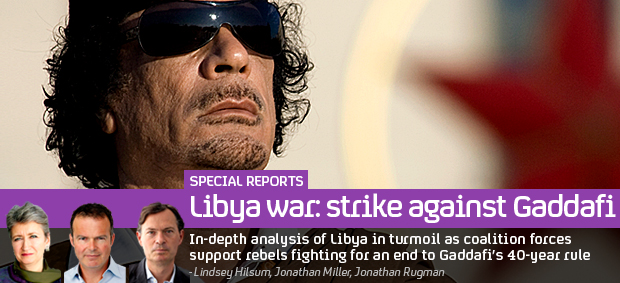Congressmen to sue Obama over Libya involvement
As 10 Congressmen begin legal action to halt US involvement in Libya, David Cameron says the cost of operations is sustainable. Channel 4 News looks at who is winning the war in Libya.
Reports are emerging that a bi-partisan group of congressmen is launching a legal challenge to American participation in Libya.
It is believed that 10 members will refer to the War Powers Resolution as well as the role of Congress in protecting taxpayers’ money in the lawsuit.
Congressman Dennis Kucinich said in a statement that the lawsuit will “challenge the executive branch’s circumvention of Congress and its use of international organizations such as the UN and NATO to authorize the use of military force abroad, in violation of the Constitution”.
He added: “With regard to the war in Libya, we believe that the law was violated. We have asked the courts to move to protect the American people from the results of these illegal policies.”
With regard to the war in Libya, we have asked the courts to move to protect the American people from the results of these illegal policies. Congressman Dennis Kucnich
House Speaker John Boehner has also sent a letter to Mr Obama warning that the White House could be in violation of the War Powers Resolution if it fails to get congressional authorization by 19 June, which he notes will be the 90th day since the mission began.
The War Powers Resolution states that a president who commits troops to war must explain the legal reasoning for doing so within 60 days. That period can be extended to 90 days if the president requests more time from Congress, which Mr Obama did not do. After 90 days, the president is required to obtain congressional approval for action.
Mr Obama announced the US involvement in the mission in March and said US forces would take the early lead in establishing a no-fly zone over Libya in order to enforce a UN resolution calling for the protection of Libyan civilians from forces loyal to Col Muammar Gadaffi. But the United States has assumed a supporting role as NATO has taken over the mission.
Cameron hits back over spending
Meanwhile, the head of the Royal Navy has agreed that Britain can sustain its military intervention in Libya for “as long as we need to”, Mr Cameron said on Wednesday.
Admiral Sir Mark Stanhope, the First Sea Lord, had said on Tuesday that the Navy had planned for a six-month commitment in Libya and the government must make “challenging decisions” about what it wanted to do after.
He said: “How long can we go on as we are in Libya? Certainly – in terms of Nato‘s current time limit that has been extended to 90 days – we are comfortable with that.
“Beyond that we might have to request the government to make some challenging decisions about priorities.
“There are different ways of doing this. It’s not simply about giving up standing commitments, we will have to rebalance,” he continued.
But on Wednesday, the Prime Minister was told MPs that Adm Stanhope had changed his mind.
“I had a meeting with the First Sea Lord yesterday and he agreed that we can sustain this mission as long as we need to,” said Mr Cameron.
“I want one simple message to go out from every part of this government and indeed every part of this House of Commons, and that is that time is on our side.
“We have got NATO, we’ve got the United Nations, we’ve got the Arab League, we have right on our side.
“The pressure is building militarily, diplomatically, politically, and time is running out for Gaddafi.”
NATO Secretary General Anders Fogh Rasmussen is set to meet Mr Cameron in London to discuss the nearly three-month-old operation, which has so far failed to oust Gaddafi or enable the rebels to capture Tripoli.
Read more: Apaches mark 'serious moment' in conflict and cost of Libya
